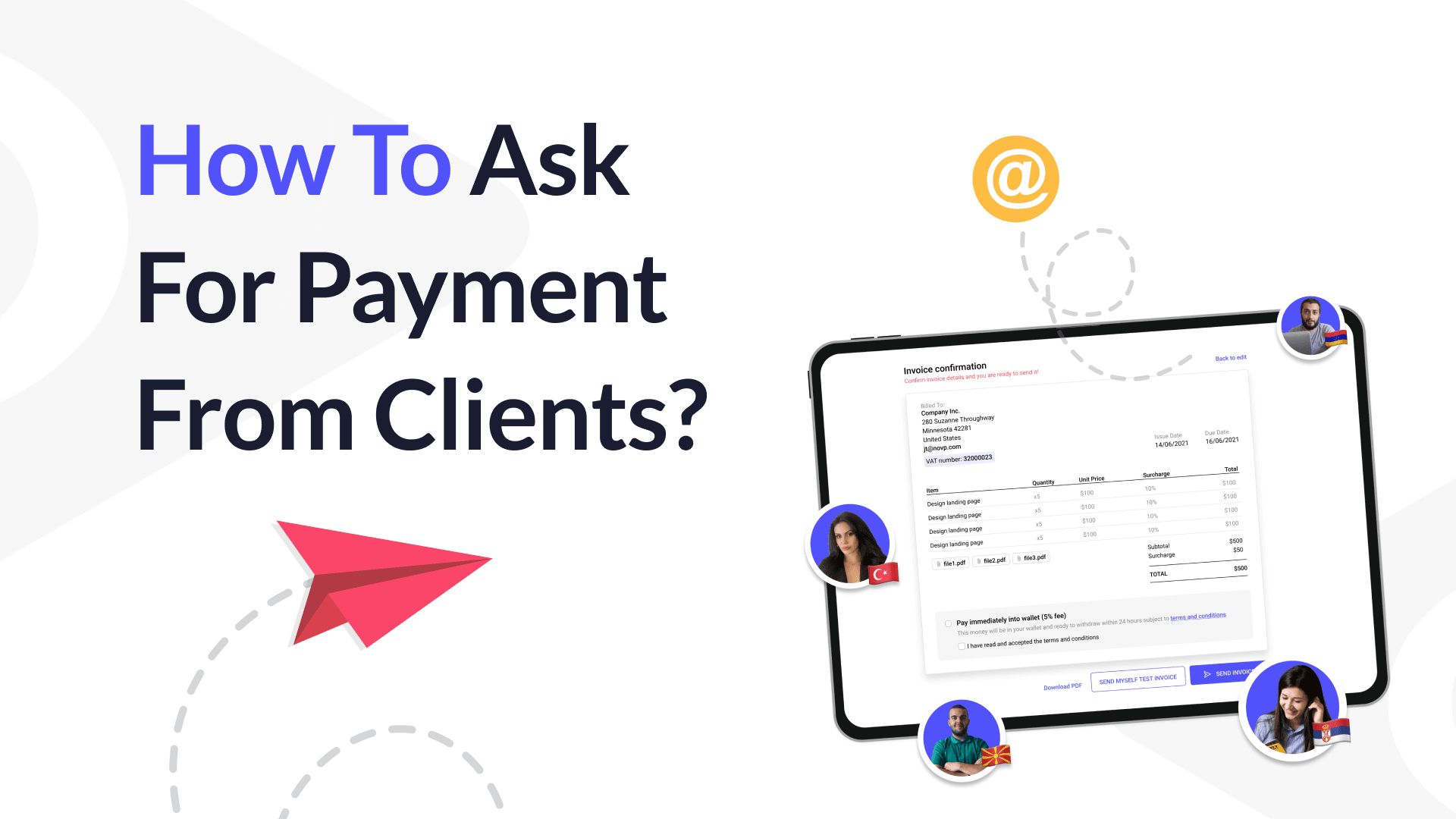How To Ask For Payment From Clients?
Receiving payments when freelancing is the biggest motivation when working for clients. However, one of the biggest challenges that freelancers still face is getting paid on time. Research shows that up to 29% of freelancers’ invoices are paid late by a client, which can create further problems such as cash flow issues, lost time, anxiety, and strained relationships with clients.
Regardless of your qualifications, knowing how to ask your clients for your well-deserved payments is a valuable skill that can be helpful throughout your career. With suitable communication on both sides, freelancers can make invoicing a piece of cake and overdue invoices can become a thing of the past.
Check out our tips and see how you can professionally and politely ask for payments from your clients.

When to Send a Payment Request Email to a Client?
We recommend you send two separate emails to your clients about your payment before the due date and if necessary, also a reminder after that.
Once you’re done with all the tasks you’ve been contracted for, you should send your client a payment request email with an attached invoice. Put the due date for the payment no sooner than 2 weeks and no later than a month after you’ve completed the tasks.
Then, you should send another email with a reminder on the due date, politely reminding your client about the work you’ve done for them. This would be your second time sending a payment request to your clients.
If a few days after the deadline you still haven’t received payment, it’s time for another email. This time you should write a more direct one. Make sure to ask if there are any issues with the payment options and if there’s anything you can help them with.
Additionally, if there is still no payment and no reply from your client, you could follow up with a phone call, and in the end, even use a debt collection agency for large outstanding amounts.

How to Ask For Payments?
Some people find it pretty uncomfortable to talk about money. Even in this day and age, the subject of money can still feel like a taboo topic.
Even though we would like this to not be the case, it’s quite likely that you’ll have to ask a client about your overdue invoice at least at some point in your career.
Good communication is the key here. Simply demanding to get what you’re due from them will not get you far and it can also prevent you to get more work in the future.
When you’re asking your clients for payments, always make sure to communicate in a professional manner, go straight to the point and be firm. You should also always remain calm and polite as well as persistent when reminding your clients.

What To Include In Your Payment Request Email?
There are a few items you should always include in your payment request email.
First, start with a clear subject line, indicating project details as well as the invoice number. Include a brief description of what you did for them and make sure to attach the invoice.
Make sure to include the total amount that has to be paid and different payment methods with which they can pay you and the due date when the invoice should be paid.
Payment Request Letter Template
Here’s a template you can use to request a payment from your client.
Subject: Payment Request for [project name/invoice number]
Dear [client’s name],
I hope this email finds you well.
[Briefly explain the tasks you completed for this project]
I’m attaching the invoice for the [project name]. As agreed, the total amount is [number], payable until [due date] via [preferred payment method].
Thank you and I look forward to working with you in the near future,
[your name/your signature]
What to Avoid In the Payment Request Letter?
Even though not getting paid on time can potentially throw you off your track, it’s essential to not let your emotions get in the way and stay professional. To help you avoid mistakes when sending payment requests letters, here’s what you should avoid:
Don’t send vague payment requests
When sending payment requests, make sure to include all the necessary information. Always have a strong subject line, list your completed tasks and include precise invoice or payment information. Don’t forget to include the due date and make sure you use formal language.
Don’t be too personal
Avoid including too much irrelevant information about your personal life when you talk about payments with your clients. Leave out all the information that is too informal or indirect.
Don’t send threatening emails
It’s understandable that you might get upset if you don’t receive your payments, but the threats are likely to be ineffective or even counterproductive. Make sure always to stay professional and calm.

Tips For Getting Paid On Time
To avoid unpleasant experiences with some of your clients, here are some tips to help you get paid on time.
Require a deposit upfront
This is probably the best advice any fellow freelancer would give you. But getting an initial and nonrefundable payment before you start any project can drastically reduce the chance your client will pay late. Plus, the advance compensation can help you sustain your cash flow.
Offer multiple options for payment
If you want to receive your payments in time, then make sure to give your clients a few different payment options, including online transactions in multiple currencies.
Did you know that with Native Teams you can easily send payment requests or invoices to your clients, receive payments directly into your digital wallet and withdraw your funds with a Native ATM card? Sign up here and explore your options.
Introduce late fees for late payments
Many freelancers and remote workers use late fees to make sure they receive their payments on time. They are definitely effective in enforcing deadlines, but they shouldn’t come as a surprise. We recommend you inform your clients about the consequences of late payments already at the beginning of your collaboration.
Asking For Payments Can Be Done Politely And Professionally
Asking for payments is definitely not a piece of cake, but it’s important to learn this valuable skill that will be helpful throughout your career.
Making sure you’re prepared for any scenario, especially when dealing with new clients, can help you reduce stress and make sure you keep good relationships with them which can help you score more potential projects or deals.

How Can Native Teams Help You Send Payment Requests?
Native Teams provides all the tools you need to take your freelancing gig to the next level. With our own easy-to-use invoicing tool you can invoice all your clients with just a few clicks with our prebuilt templates.
When you send invoices to your clients via Native Teams, you will receive the payments directly into your virtual wallet. You can then transfer the funds to your local bank or use our Native ATM to withdraw anywhere in the world or spend online. You can sign up completely for free and explore your options.
